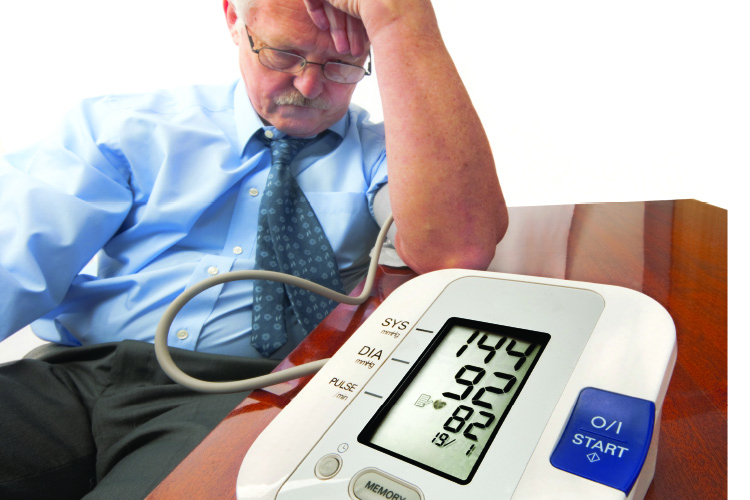Checking your blood pressure is a routine medical assessment that you may not have paid much attention to. What these blood pressure readings really say about us, and how important are the readings to your health and well-being?
Be warned that hypertension has been on the rise among Malaysians over the past 10 years, and now affects an estimated 4.8 million with almost 43% over the age of 30 suffering from this chronic disease, with an alarming increase from 33% recorded in 1996.1
If you didn’t pay heed about hypertension in the past, it’s about time you did. Here are some basic facts and figures for quick understanding.
Table of Contents
WHAT IS HIGH BLOOD PRESSURE?
High blood pressure (HBP) or hypertension means high pressure (tension) in the arteries. Arteries are vessels that carry blood from the pumping heart to all the tissues and organs of the body. It is known as the “silent killer” since it has no initial symptoms but can lead to long-term disease and complications.
HOW IS BLOOD PRESSURE MEASURED?
Blood pressure is measured with a blood pressure cuff and recorded as two numbers, for example, 120/80 mm Hg (millimeters of mercury). Blood pressure measurements are usually taken at the upper arm over the brachial artery.
• The top, larger number is called the systolic pressure. This measures the pressure generated when the heart contracts (pumps). It reflects the pressure of the blood against arterial walls.
• The bottom, smaller number is called the diastolic pressure. This reflects the pressure in the arteries while the heart is filling and resting between heartbeats.
The American Heart Association has recommended guidelines to define normal and high blood pressure.
• Normal blood pressure less than 120/80
• Pre-hypertension 120-139/80-89
• High blood pressure (stage 1) 140-159/90-99
• High blood pressure (stage 2) higher than 160/100
RISKS
Uncontrolled high blood pressure may be responsible for many cases of death and disability resulting from heart attack, stroke, and kidney (renal) failure, hardening of the arteries (atherosclerosis or arteriosclerosis), eye damage, and stroke (brain damage). Maintaining lifelong control of hypertension decreases the future risk of complications.
CAUSES
In 90% of people with hypertension, the cause of high blood pressure is not known and is referred to as primary or essential hypertension. While the specific cause is unknown, there are risk factors that can contribute to developing high blood pressure.
Factors that cannot be changed
• Age: The older a person is, the greater the likelihood that he or she will develop high blood pressure.
• Race: Certain races are more susceptible to develop high blood pressure than others. (For example, in the USA, African Americans develop high blood pressure more often than Caucasians).
• Family history (heredity): The tendency to have high blood pressure appears to run in families.
• Gender: Generally men have a greater likelihood of developing high blood pressure than women.
Factors that can be changed
• Obesity: Obese people are two to six times more likely to develop high blood pressure than people whose weight is within a healthy range.
• Sodium (salt) sensitivity: Some people have high sensitivity to sodium (salt), and their blood pressure increases if they use salt. Reducing sodium intake tends to lower their blood pressure.
• Alcohol use: Drinking more than one to two drinks of alcohol per day tends to raise blood pressure in those who are sensitive to alcohol.
• Birth control pills (oral contraceptive use): Some women who take birth control pills develop high blood pressure.
• Lack of exercise (physical inactivity): A sedentary lifestyle contributes to the development of obesity and high blood pressure.
• Medications: Certain drugs, diet pills, and some medications used for cold and allergy symptoms, tend to raise blood pressure.
HIGH BLOOD PRESSURE MANAGEMENT
The management and control of high blood pressure involves two major options, lifestyle modification and medication.
LIFESTYLE MODIFICATIONS
Weight control
• Aim for a healthy weight range for your height and body type. Your health care practitioner can help you calculate a healthy target weight.
• Even a small amount of weight loss can make a major difference in lowering or preventing high blood pressure.
• You must burn more calories than you take in to lose weight.
• Crash or fad diets are not helpful and may be dangerous.
Exercise or Increase Physical Activity
• Physical activity reduces total cholesterol and bad cholesterol (low density lipoprotein or LDL) and raises the good cholesterol (high density lipoprotein or HDL).
• 30 minutes of physical activity on most days of the week is recommended.
MEDICAL TREATMENT
If these lifestyle changes and choices don’t work, medications should be added. The medications have been proven to reduce the risk of stroke, heart disease, and kidney problems. Do not stop taking your medications without talking to your health care practitioner.
OTHER THERAPY
- Alternative therapies may be helpful to people trying to control their blood pressure.
- Acupuncture and biofeedback are well-accepted alternative techniques that may help some people with high blood pressure.
- Techniques that induce relaxation and reduce stress are recommended. These include meditation, yoga, and relaxation training.
HIGH BLOOD PRESSURE PREVENTION
High blood pressure may be prevented by living a healthy lifestyle, including some of the following:
- Eat a nutritious, low-fat diet;
- Exercise regularly;
- Reduce salt (sodium) intake, read food labels so you know the salt content before you buy a product in the grocery store or eating a meal at a fast food restaurant, and avoid adding salt to foods;
- Maintain a healthy weight and if you are overweight or obese, try to lose weight;
- Drink alcohol in moderation;
- Stop smoking;
- Reduce stress and practice relaxation techniques, physical activity will help with this.
- Get routine health assessments and blood pressure screening; and
- Taking your blood pressure medications as directed, even if you’re feeling fine.
















